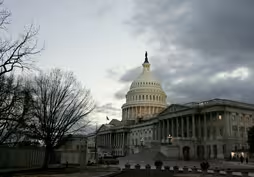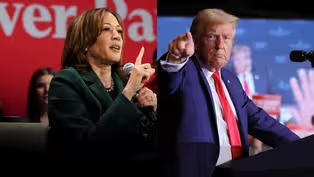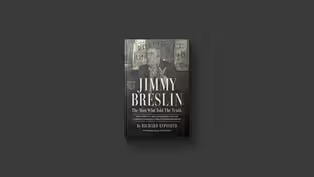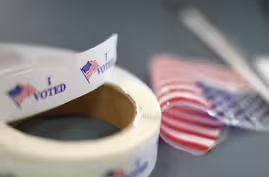
'Click-to-cancel' would make it easier to end subscriptions
Clip: 10/22/2024 | 5m 55sVideo has Closed Captions
FTC's 'click-to-cancel' rule would make it easier to end subscriptions
A proposed rule from the Federal Trade Commission aims to let consumers easily cancel unwanted subscriptions. It would require getting out of those plans to be as easy as it was getting in. But many businesses argue the move is unnecessary meddling that will harm consumers. William Brangham discussed more with Erin Witte of the Consumer Federation of America and a supporter of this rule.
Problems playing video? | Closed Captioning Feedback
Problems playing video? | Closed Captioning Feedback
Major corporate funding for the PBS News Hour is provided by BDO, BNSF, Consumer Cellular, American Cruise Lines, and Raymond James. Funding for the PBS NewsHour Weekend is provided by...

'Click-to-cancel' would make it easier to end subscriptions
Clip: 10/22/2024 | 5m 55sVideo has Closed Captions
A proposed rule from the Federal Trade Commission aims to let consumers easily cancel unwanted subscriptions. It would require getting out of those plans to be as easy as it was getting in. But many businesses argue the move is unnecessary meddling that will harm consumers. William Brangham discussed more with Erin Witte of the Consumer Federation of America and a supporter of this rule.
Problems playing video? | Closed Captioning Feedback
How to Watch PBS News Hour
PBS News Hour is available to stream on pbs.org and the free PBS App, available on iPhone, Apple TV, Android TV, Android smartphones, Amazon Fire TV, Amazon Fire Tablet, Roku, Samsung Smart TV, and Vizio.
Providing Support for PBS.org
Learn Moreabout PBS online sponsorshipGEOFF BENNETT: The newly proposed rule from the Federal Trade Commission aims to let consumers easily cancel unwanted subscriptions.
But many businesses argue the move is unnecessary meddling that will harm consumers.
William Brangham joins us now with more -- William.
WILLIAM BRANGHAM: That's right, Geoff.
We have all had this experience.
You sign up for a subscription or an ongoing membership.
But then, when you're done with it, undoing that subscription is a complex, difficult, multistep process.
The FTC's new rule would require that getting out of those plans would be as easy as it was getting in.
Erin Witte is director of consumer protection for the Consumer Federation of America and a supporter of this rule.
Erin, thank you so much for being here.
They call this new rule click to cancel.
Can you just tell us, in practicality, how would it roll out?
ERIN WITTE, Director of Consumer Protection, Consumer Federation of America: So the purpose of this rule is to really align the interests of consumers and businesses by making businesses rely on affirmative consumer choice, rather than trapping them in a subscription.
The click to cancel part of the rule simply says that, if a consumer is in a subscription, it should be as easy to get out of the subscription as it was to get in.
And by making it easier to cancel subscriptions, the Federal Trade Commission is making sure that consumers are able to get and keep the products that they really want and break up with the ones that they don't.
It also gives businesses a very clear standard for what it means to have a simple cancellation process.
WILLIAM BRANGHAM: What is the rationale for this?
I mean, I mentioned how it's -- it can be very complex and burdensome to do it, but what is the actual harm that is being addressed here?
ERIN WITTE: Well, we have seen a number of complaints to federal and state government agencies.
The Federal Trade Commission estimates that they receive about 70 complaints per day about illegal and deceptive subscription traps.
We have also seen federal class actions that talk about this.
And I think that what it really removes from the process is the affirmative consumer choice.
So consumers end up paying for things that they might not want anymore.
And that might just be a product of inertia.
They may have forgotten about it or they may have just relented because they weren't actually able to get out of that subscription because the company designed it to be that way.
The company designed the subscription to be really difficult to cancel in order to trap somebody in it and keep billing them over and over and over for this product.
WILLIAM BRANGHAM: You mentioned that this is streamlining the process for businesses as well.
But a lot of businesses, as you know, don't like this rule.
They argue that it is just governmental meddling.
Neil Bradley of the U.S. Chamber of Commerce was one of those critics.
He said this: "Not only will this rule deter businesses from providing sensible consumer-friendly subscriptions, but will leave Americans with fewer options, higher prices and more headaches."
I mean, as a proponent of this rule, what would you say to that critique?
ERIN WITTE: Well, I'm not surprised to see critiques because businesses can make a lot of money off of consumers that just forget to cancel a subscription.
They can really rely on this phenomenon called inertia.
And a group of researchers from Stanford University actually studied this and said -- they looked at debit in credit card activity and evaluated when consumers had their card canceled, right, and they had to actually actively opt back into that subscription.
They were about four times more likely to cancel and not continue that subscription.
So when consumers are making affirmative choices, we can see that they don't want these subscriptions quite as often.
And, frankly, this rule doesn't make subscription practices illegal.
It makes them fair and it makes sure that consumers have the freedom to break up with a product that they no longer want, instead of being trapped by a business' dark pattern of design that keeps filling them over and over for something that they might not really want.
WILLIAM BRANGHAM: I mean, as you know, we are in the middle of an election season.
Could be a brand-new administration coming in.
Is this the kind of thing that a potential Trump administration, as opposed to the Biden administration, could undo when they get into office?
ERIN WITTE: Well, I won't be surprised at all to see a legal challenge to the rule, trying to strike it or render it ineffective.
A new administration could certainly slow down that process.
But this shouldn't be a partisan issue.
We have seen Republicans support legislation that actually goes further than what the FTC's final rule did in making subscriptions easier to cancel.
And, frankly, a survey of voters said that many of those voters supported the FTC's efforts to rein in deceptive subscription practices, including 80 percent of the Republican voters that responded.
So this should not be a partisan issue.
Republicans should get on board and consider this a win, because it's clear that consumers want and desperately need this very commonsense change.
WILLIAM BRANGHAM: I mean, this is just one of several of what people would argue is an activist move by the FTC.
How does this fit into the broader mission as elucidated by Chairman Lina Khan?
ERIN WITTE: Well, I think Chair Khan is paying attention to what is really harming consumers and what consumers are really complaining about and where they are having money siphoned out of their pockets, not necessarily with their consent.
And so I think this is a very commonsense solution to an extremely pervasive problem that everyone can relate to.
The chair has had a phenomenal record of responding to everyday problems that hurt the pocketbooks of Americans.
And what she's trying to do is what she's done with her other consumer protection rulemakings, enforcement efforts, and public statements like policy statements and guidance, which is to give consumers freedom, freedom to make the choices that they want to engage with the product that they choose.
WILLIAM BRANGHAM: All right, Erin Witte of the Consumer Federation of America, thank you so much for being here.
ERIN WITTE: Thank you for having me.
Democrats concentrate on N.Y. races that could decide House
Video has Closed Captions
Clip: 10/22/2024 | 7m 12s | Democrats concentrate on New York congressional races that could decide House majority (7m 12s)
Detroit's 'Little Village' gives local artists a home
Video has Closed Captions
Clip: 10/22/2024 | 7m 5s | Detroit's 'Little Village' project transforms a neighborhood and gives local artists a home (7m 5s)
Harris and Trump court Latino voters with 2 until election
Video has Closed Captions
Clip: 10/22/2024 | 3m 38s | Harris and Trump make appeals to Latino voters 2 weeks ahead of Election Day (3m 38s)
Israeli strikes put Lebanese health workers in line of fire
Video has Closed Captions
Clip: 10/22/2024 | 6m 1s | Lebanese healthcare workers caught in the line of fire from Israeli airstrikes (6m 1s)
Jimmy Breslin remembered in book as 'Man Who Told the Truth'
Video has Closed Captions
Clip: 10/22/2024 | 6m 28s | Reporter Jimmy Breslin remembered in new biography as 'The Man Who Told the Truth' (6m 28s)
Montana primary proposal could cut down on partisan divides
Video has Closed Captions
Clip: 10/22/2024 | 4m 17s | How a Montana proposal to change its primary system could cut down on partisan divides (4m 17s)
State measures may have national impact by boosting turnout
Video has Closed Captions
Clip: 10/22/2024 | 4m 8s | A look at the state measures that could have national impact by boosting election turnout (4m 8s)
Providing Support for PBS.org
Learn Moreabout PBS online sponsorship
- News and Public Affairs

FRONTLINE is investigative journalism that questions, explains and changes our world.

- News and Public Affairs

Amanpour and Company features conversations with leaders and decision makers.












Support for PBS provided by:
Major corporate funding for the PBS News Hour is provided by BDO, BNSF, Consumer Cellular, American Cruise Lines, and Raymond James. Funding for the PBS NewsHour Weekend is provided by...






